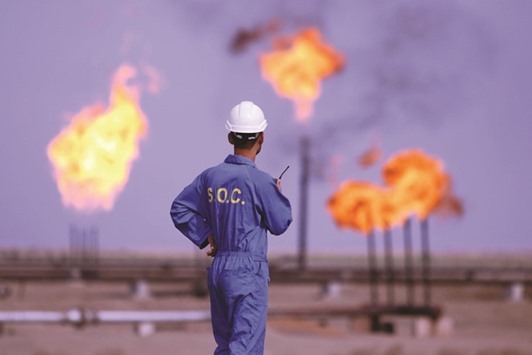Iraq’s southern crude oil exports dropped in January from a record high a month before as the country implements output cuts agreed by Opec and other major producers to curb the global glut.
The nation’s exports decreased 187,000 bpd to 3.323mn bpd in January from the previous month, according to a person familiar with the matter, who didn’t want to be identified because the data isn’t public.
The Oil Ministry’s spokesman couldn’t immediately be reached on Friday, which is a weekly holiday in Iraq.
Shipments in January from the South Oil Co were 3.278mn bpd and exports from the North Oil Co 45,000 bpd, the person said. Iraq’s exports from the south had risen to a record average of 3.51mn bpd in December, Oil Minister Jabbar al-Luaibi said on January 9.
Opec and 11 other major-producing countries including Russia agreed late last year to cut a combined 1.8mn bpd of output for six month starting from January, with Iraq’s share set at 210,000 barrels.
Some analysts expressed doubts that Iraq would deliver its share of the cuts, potentially undermining the drive to rebalance the market and drain inventories bloated by two years of unfettered production that helped to crash prices.
During the months of negotiation that led to November’s Opec agreement, Iraq had insisted repeatedly that it should be exempted from cuts as it battles the Islamic State insurgency and rehabilitates its oil industry after years of war and sanctions. The country also disputed the data to be used in any discussions, insisting that numbers compiled by Opec underestimated Iraqi production by about 5%.
Iraq ultimately relented, agreeing to reduce its output.
Iraq was close to implementing its share of the agreed production cuts and would be in full compliance by the end of the month, al-Luaibi said on January 23. The Middle Eastern producer had already reduced output by 180,000 bpd and would cut another 30,000 soon, the minister said in a Bloomberg television interview.
Oil production unscathed for now by Trump ban
Bloomberg/Dubai
Iraq’s decision not to reciprocate for US President Donald Trump’s visa ban on citizens of seven mostly Muslim countries offers some reassurance for US oil companies working in Opec’s second-biggest crude producer.
US companies working in Iraq include Exxon Mobil Corp and oil-service providers Schlumberger Ltd, Halliburton Co and Baker Hughes. Most expatriates in Iraq work on rotation, leaving and returning to the country every few weeks, a routine that any entry ban would have disrupted.
“If the policy was reciprocated, it could have been catastrophic for both countries,” Luay al-Khatteeb, a fellow at Columbia University’s Center on Global Energy Policy, said by phone from London. “It would have affected production.” Iraq pumped 4.61mn bpd in December, data compiled by Bloomberg show.
Trump issued the executive order on January 27, in the name of fighting terrorism. Iraqi lawmakers last Monday condemned the move, noting that Iraqi forces are on the front line in the battle against Islamic State militants, and urged their government to reciprocate.
Prime Minister Haider al-Abadi declined to issue a ban.
“We won’t apply the same rules,” the prime minister said. “Fighting terror is a strategic issue for us.”
Exxon, Baker Hughes and Halliburton declined to comment on the Iraqi prime minister’s decision, while representatives for Schlumberger didn’t immediately respond when asked for comment.
Trump’s visa ban probably won’t have a direct impact on the companies’ operations in Iraq, as many send their Iraqi staff to other places in the Middle East for training and meetings rather than to the US, said Robin Mills, chief executive officer of consultant Qamar Energy in Dubai. “It wasn’t easy for Iraqis to get visas before anyway,” he said.
Mistrust and hostility caused by Trump’s order could harm US businesses’ chances of winning future contracts in Iraq, Mills said. No US oil companies have sought to take part in a bidding round to develop 12 small to medium-sized oil fields, due to take place this year.
The US ban also applies to the semi-autonomous Kurdish region in northern Iraq. Chevron Corp, which is exploring for oil in the Kurdish enclave, said on Monday that it didn’t anticipate any impact from the travel ban.
Kurdish authorities consider the US an ally but expect “more assistance and understanding” from the Trump administration for Iraq and the Kurds, who have been battling Islamic State and harbouring refugees, Safeen Dizayee, spokesman of the Kurdistan Regional Government, said on Tuesday in a text message.
Of the seven countries targeted by the order, only Iran has so far announced reciprocal measures. Iran’s Foreign Minister Mohammad Javad Zarif tweeted that his country would stop issuing visas to Americans but not bar those who already hold one, describing the US measure as a “great gift to extremists.”

An Iraqi labourer works at an oil refinery in the southern town Nasiriyah (file). The nation’s exports decreased 187,000 bpd to 3.323mn bpd in January from the previous month, according to a person familiar with the matter.
